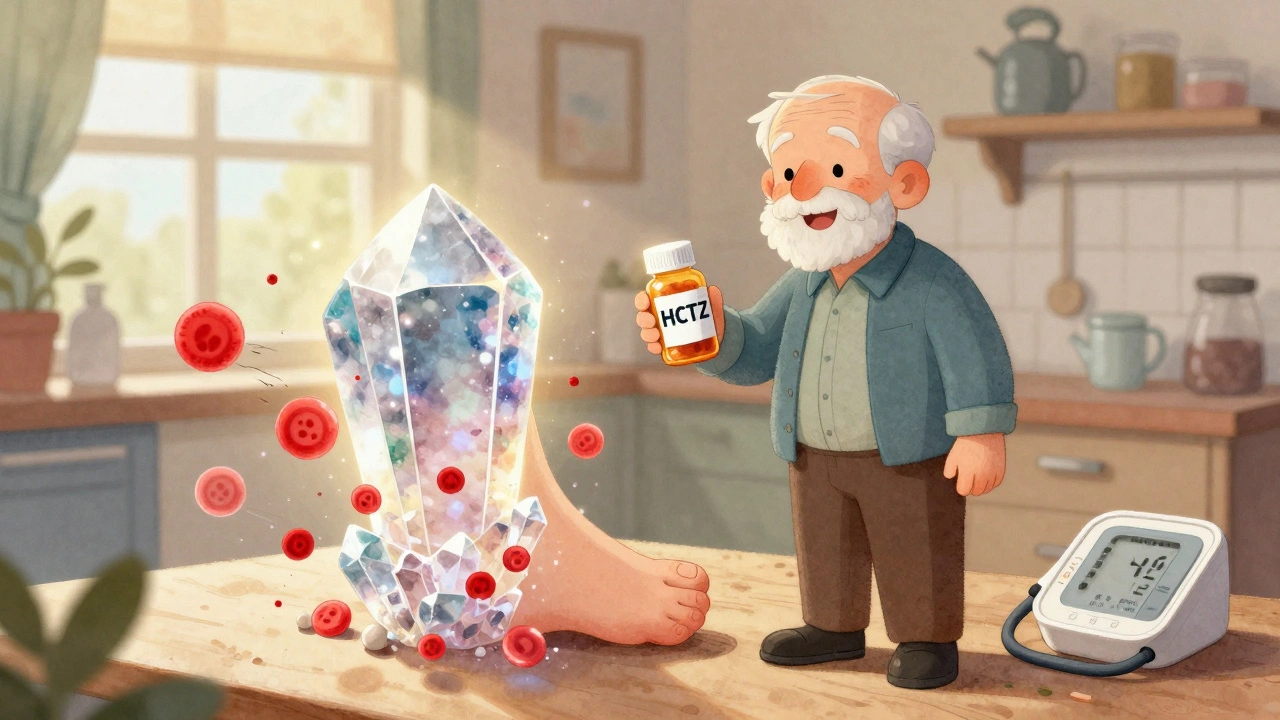Hydrochlorothiazide: What It Is and Why You Might Need It
If you’ve been told to take a "water pill," chances are your doctor meant hydrochlorothiazide. It’s a thiazide‑type diuretic that helps the body get rid of excess salt and water. People use it to lower high blood pressure, reduce swelling from heart failure or kidney problems, and prevent calcium stones.
How Hydrochlorothiazide Works
The drug acts on tiny tubes in your kidneys called distal tubules. It blocks the re‑absorption of sodium, which pulls water along with it into the urine. Less fluid in the bloodstream means lower pressure on vessel walls and less swelling in tissues. The effect starts within a few hours and lasts most of the day.
Typical Dosage and Who Uses It
Doctors usually start adults at 12.5 mg to 25 mg once daily, often with breakfast to avoid nighttime trips to the bathroom. Some patients need up to 50 mg, but higher doses increase the risk of low potassium or dehydration. Kids may get a lower dose based on weight, and seniors often require an even smaller amount because kidneys work slower.
Hydrochlorothiazide is common for:
- Stage 1‑2 hypertension
- Fluid buildup from congestive heart failure
- Edema caused by liver or kidney disease
Side Effects You Should Watch For
The most frequent complaint is frequent urination, especially when you first start. Low potassium (hypokalemia) can cause muscle cramps or weakness; a simple blood test checks your levels. Other possible effects include dizziness, light‑headedness, higher blood sugar, and rare skin rashes.
If you notice severe stomach pain, sudden vision changes, or extreme fatigue, call a doctor right away—those could signal serious problems.
Drug Interactions and Precautions
Hydrochlorothiazide can boost the effect of other blood pressure meds, which may drop your pressure too low. It also interacts with lithium (increases toxicity) and certain anti‑inflammatory drugs that raise kidney stress. Always tell your pharmacist about every prescription, over‑the‑counter pill, or supplement you take.
People with severe kidney disease, gout, or an allergy to sulfa drugs should discuss alternatives before starting.
Buying Hydrochlorothiazide Online – Safe Tips
When you need a refill and want the convenience of online ordering, follow these steps:
- Choose a pharmacy that requires a valid prescription. Legit sites never sell the drug without one.
- Check for a physical address and a licensed pharmacist’s contact info on the site.
- Look for accreditation symbols like VIPPS or NABP; they prove the pharmacy follows U.S. standards.
- Read customer reviews, but beware of overly perfect testimonials that look scripted.
After you place an order, keep a copy of the prescription and the receipt. If the price looks too good to be true, it probably is—counterfeit pills can cause dangerous health issues.
Key Takeaways
Hydrochlorothiazide is an effective, inexpensive option for controlling blood pressure and reducing fluid retention. Start with a low dose, monitor potassium levels, and stay aware of drug interactions. If you order it online, verify the pharmacy’s legitimacy before buying.
Thiazide Diuretics and Gout: What You Need to Know About Uric Acid Risks
Thiazide diuretics like hydrochlorothiazide effectively treat high blood pressure but can raise uric acid levels, triggering gout in susceptible people. Learn the risks, signs, and safer alternatives.
READ MOREUnderstanding Zestoretic: Uses, Side Effects, and Real Tips for Blood Pressure Control
Everything you should know about Zestoretic, its role in managing high blood pressure, how it works, possible side effects, and tips for safer use at home.
READ MORE

